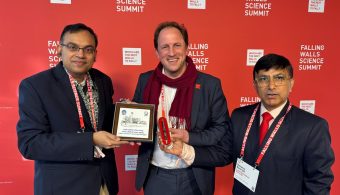Image Credit: The Indo-German Chamber of Commerce
The Indo-German Chamber of Commerce (IGCC) brought together over 300 leaders from business, government, and diplomacy at the IGCC Industry Dialogue 2025 in New Delhi on 26 August, underscoring the growing importance of Indo-German collaboration in shaping sustainable industrial growth.
The event, held at the Taj Mahal Hotel, showcased wide-ranging discussions on investment, clean energy, smart logistics, and trade policy, with experts stressing that India’s growth path hinges on accelerating green technologies, modernising supply chains, and concluding the long-awaited EU–India Free Trade Agreement (FTA).
German Firms Signal Strong Investment Appetite
Opening the dialogue, Jan Noether, Director General of IGCC, underlined the role of German companies already present in India. “With nearly 2,000 German firms operating locally, the Dialogue offered a vital space for exchanging ideas and strengthening Indo-German industrial ties,” he said.
Georg Enzweiler, Chargé d’Affaires at the German Embassy, praised IGCC’s initiative, calling such forums crucial to “addressing business challenges and unlocking new opportunities.”
Institutional voices also reinforced Germany’s commitment. Seema Bhardwaj of Germany Trade & Invest (GTAI) and Farhad Vania of GIZ highlighted the importance of sustained policy support to enable industrial transformation.
Green Economy in Focus
One of the headline sessions, “Unlocking the Green Economy,” explored joint pathways for decarbonisation and clean infrastructure.
“Clean technologies must scale rapidly if India is to meet its decarbonisation goals while sustaining growth,” said Sanghamitra Jayant Biswas of Siemens Energy India, adding that German renewable know-how and India’s vast market created “a natural complementarity” in energy cooperation.
Bipin Chandra of EDAG India stressed that German engineering standards and digital solutions could help India build resilient infrastructure, while Deepak Zade of TÜV SÜD pointed to the need for safety and compliance frameworks to build trust in renewable projects.
On financing, Stefan Kliesch of KfW Development Bank detailed Germany’s support for India’s renewable sector, including solar, wind, and the Green Energy Corridor. “Concessional loans and blended finance are critical to mobilise capital at scale,” he noted.
The panel, moderated by Clemens Antretter of GIZ, concluded that German technology and India’s market scale together could drive global green growth.
Rethinking Supply Chains: Smart Logistics
Another key session, “Beyond Automation: The Strategic Value of Smart Logistics,” brought supply chain transformation into focus.
“Logistics costs directly impact India’s ease of doing business,” said R.S. Subramanian of DHL Express India, urging faster adoption of data-driven systems.
Vivek Arya, CEO of Rhenus Logistics, called for standardized infrastructure and collaborative models, while Shankar Iyer of Lufthansa Cargo stressed automation’s role in bridging operational and skill gaps.
The panel, moderated by Raghu Babu Nukala of GIZ, noted that India could meet its 2030 logistics targets if reforms are matched with private sector investment.
EU–India Free Trade Agreement Back in Spotlight
The prospect of an EU–India FTA took center stage in a fireside chat between Varda Taneja of the Federation of European Business in India (FEBI) and IGCC’s Jan Noether.
“The agreement’s strategic importance lies in creating resilient supply chains and deepening EU–India economic cooperation,” Taneja said. She highlighted potential gains in pharmaceuticals, digital services, and green technologies through lower tariffs and simplified regulations.
Shared Path Ahead
The IGCC Industry Dialogue 2025 was supported by the German Embassy, GTAI, GIZ, and the Indo-German Energy Forum Support Office (IGEF-SO). Lead partners included EDAG and Phoenix Contact, with corporate contributors such as DHL, Infineon Technologies, TÜV SÜD, BMW, Henkel, Rhenus Logistics, and Orafol.
Experts at the event agreed: India’s ability to combine scale with sustainability will hinge on deeper Indo-German collaboration across technology, finance, and trade policy.



